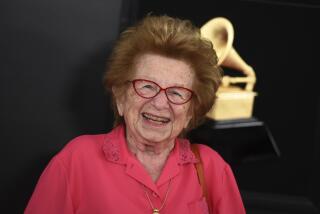Sex Talk for Students, Minus Birds and Bees
- Share via
Deborah Roffman has been teaching human sexuality since the early 1970s, when many of us thought sex was a right, not a lesson plan.
But we are parents now, panicking. We fear that sex education will be interpreted by our children as permission to engage, and sex is much more dangerous than it was in the 1970s, when the pill was the antidote to our one fear.
Roffman has written a new book titled “Sex and Sensibility: The Thinking Parent’s Guide to Talking Sense About Sex.” It is written to help loosen our tongues, so we can explain to our children the pleasures and risks of an activity we so joyfully embraced.
It is a wonderful book. It untangles the knotted ball of yarn that we have made of the subject. It is also a clearheaded script for talking to your children about sex.
But this story isn’t about the book. It isn’t even about sex.
This is about the community where this book was born, the Park School of Baltimore, and the freedom granted Roffman to think this subject through and then explain it to children.
“If Park School hadn’t found me, they would have invented me,” said Roffman, as parents, students, faculty and friends gathered for a celebration in her honor in the school library.
“They were waiting for me. I didn’t come here and yank anyone along,” Roffman said.
Indeed, on one of her first days, she walked into a classroom that had been redecorated to resemble an anatomically correct uterus. She must have wondered if she could keep up.
“The adults in this place are not afraid,” she said.
Park has a reputation as a freethinking place, at the “progressive” end of the continuum used to describe schools. Roffman was cut loose among the students--preteens as well as teens--not because the school espoused some laissez-faire ideas about sex. “They trust in the educational process,” Roffman said. “They are not afraid of communication, of information. They believe that a child’s question requires a direct response. All of that predates Debbie Roffman.”
The teachers at Park, Roffman said, “listen first and lesson-plan later.” And that approach defines Roffman’s teaching, too. She had to discard some of her preconceived notions about what the kids needed and wanted to know.
“I sat in the back of her class one day,” parent Amy Wilen said, “and the lack of self-consciousness among the kids will smack you in the face. And it is because they feel so safe.
“And they aren’t just shooting the breeze. There are tests, quizzes, things they have to know.”
Roffman is a part-time instructor at Park, and she teaches this subject at other private schools. She also has taught at prisons and military schools, but the scope and directness of her lesson plans would be unwelcome in public schools, and it is their loss.
“It was not automatic that she would be highly regarded at Park,” said Louise Mehta, the school’s associate head, in introducing Roffman. “We prefer pointed debate to soft-headed thinking and personal revelations.
“It is her sensibility, her directness about her subject, that silences us.”
Roffman cried then. And thanked her family, who she said were often embarrassed, and her students, who she said taught her how to teach by telling her what they wanted to know.
She then told a couple of funny anecdotes from the classroom, including the day she taught “fun sperm facts,” and she summed up the genial world in which she works: “True to form, no Park School mothers called to complain.”
More to Read
Sign up for our Book Club newsletter
Get the latest news, events and more from the Los Angeles Times Book Club, and help us get L.A. reading and talking.
You may occasionally receive promotional content from the Los Angeles Times.










